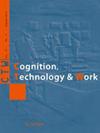信息辅助系统作为不断增加的定制和精神工作量之间的预防性中介。
IF 3.4
3区 工程技术
Q2 ENGINEERING, INDUSTRIAL
引用次数: 2
摘要
德国未来的工作将受到全球化、自动化、数字化和人口结构变化等大趋势的影响。此外,大规模定制和人工智能在手工组装中的日益普及提供了新的机会,也带来了新的挑战。大规模定制的趋势反过来又增加了生产的复杂性,这导致了额外的脑力工作量。在可预见的未来,这种影响将继续存在。方法对于德国经济的支柱——中小型企业来说,自动化和人机协作的发展将需要时间。信息辅助系统是并将成为一种过渡性技术,帮助组织管理日益增加的复杂性和员工的精神工作量,不仅可以提高生产力,还可以保持员工的健康。目前的人口变化进一步强调需要利用信息援助系统来弥补可能与年龄有关的缺陷,但也要使老年雇员致力于他们的工作,并通过参与性人体工程学避免脱离工作或被剥夺权利的影响。结果信息辅助系统只有设计为支持不同年龄、能力水平和技术亲和力的员工,才能发挥其固有的潜力。参与式发展和早期参与是提高系统接受度和使用率的关键因素,也是使其适合每个员工的个性化的关键因素。结论将心理负荷的生理相关因素作为输入,将其功能扩展为自适应辅助系统,在未来是可以想象的。本文章由计算机程序翻译,如有差异,请以英文原文为准。
Information assistance systems as preventive mediators between increasing customization and mental workload.
BACKGROUND
The future of work in Germany is shaped by megatrends like globalization, automatization, digitization, and the demographic change. Furthermore, mass customization and the increasing usage of AI even in manual assembly offers new opportunities as well as it creates new challenges.
OBJECTIVE
The trend towards mass customization in turn leads to increased complexity in production, which results in additional mental workload. This effect will continue in the foreseeable future.
METHOD
Especially for small and medium sized companies, the backbone of Germany's economy, automatization and Human-Robot-Collaboration will take time to develop. Information assistance systems are and will be a bridging technology to help organizations to manage increasing complexity and the mental workload of their employees to not only boost productivity but also keep their workforce healthy. The ongoing demographic change further underlines the need to use information assistance systems to compensate possible age-associated deficits, but also keep older employees committed to their work and avoid effects of disengagement or disenfranchisement through participatory ergonomics.
RESULTS
Information assistance systems can only develop their inherent potential if they are designed to support employees of varying age, competence levels, and affinity for technology. Participatory development and early engagement are key factors for an increased acceptance and usage of the systems as well as the individualization to make it suitable for each individual employee.
CONCLUSION
Expanding the functionalities to an adaptive assistance system, using physiological correlates of mental workload as an input, is conceivable in the future.
求助全文
通过发布文献求助,成功后即可免费获取论文全文。
去求助
来源期刊

Cognition Technology & Work
ENGINEERING, INDUSTRIAL-
CiteScore
6.90
自引率
7.70%
发文量
26
审稿时长
>12 weeks
期刊介绍:
Cognition, Technology & Work focuses on the practical issues of human interaction with technology within the context of work and, in particular, how human cognition affects, and is affected by, work and working conditions.
The aim is to publish research that normally resides on the borderline between people, technology, and organisations. Including how people use information technology, how experience and expertise develop through work, and how incidents and accidents are due to the interaction between individual, technical and organisational factors.
The target is thus the study of people at work from a cognitive systems engineering and socio-technical systems perspective.
The most relevant working contexts of interest to CTW are those where the impact of modern technologies on people at work is particularly important for the users involved as well as for the effects on the environment and plants. Modern society has come to depend on the safe and efficient functioning of a multitude of technological systems as diverse as industrial production, transportation, communication, supply of energy, information and materials, health and finance.
 求助内容:
求助内容: 应助结果提醒方式:
应助结果提醒方式:


